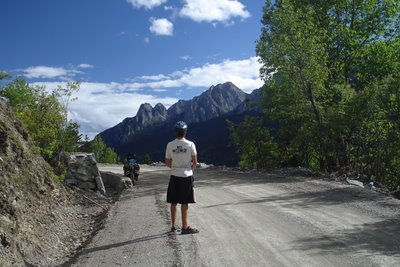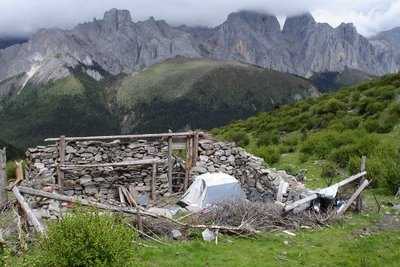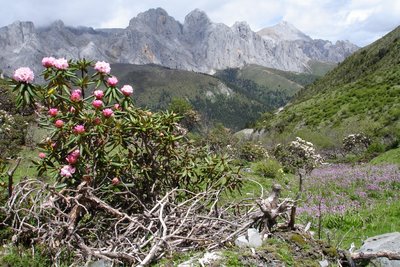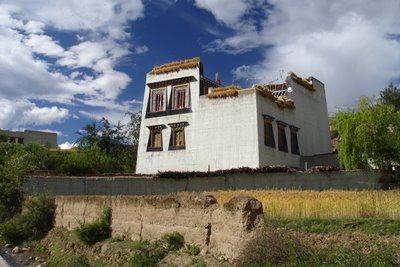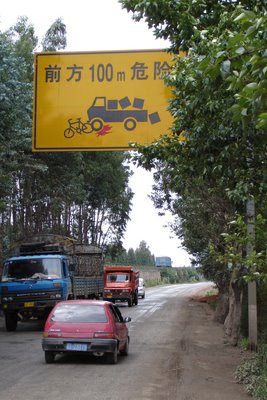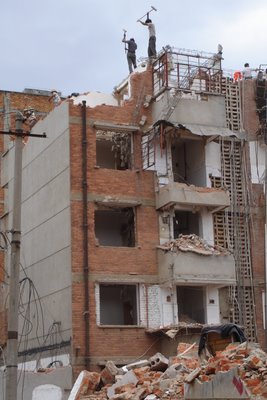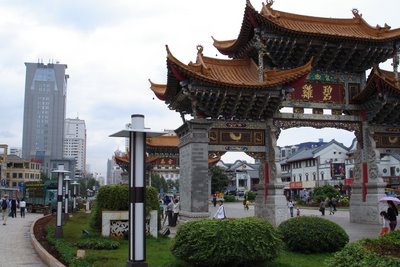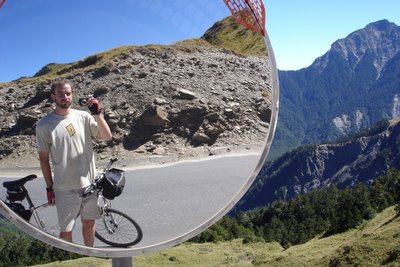We've been in the saddle riding through the Himalaya for over a week now, and decent internet connections have been hard to come by.
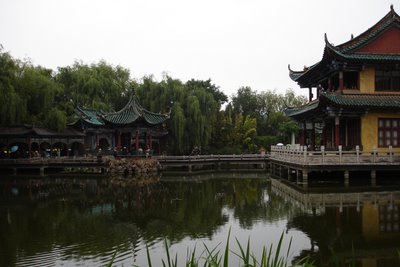 City's tend to temporarily suck the life out of me if I'm not careful, and getting a bit sick in Kunming didn't help much. But that's all over now! Mountains have the opposite effect on me.
City's tend to temporarily suck the life out of me if I'm not careful, and getting a bit sick in Kunming didn't help much. But that's all over now! Mountains have the opposite effect on me.
Since KunMing, we have spent time the backpacker center of DaLi, the Chinese tourist Mecca LiJiang, Tiger Leaping Gorge, and a backroad over a 3800 meter pass to get here.
Now we are in ZhongDian, a.k.a. Xiang Ge Li La, a.k.a. Shangri-La. Shangri-La is a bit of a strech - a ploy to bring in tourists no doubt - but it's a beautiful area none the less. On the edge of the Tibetan plateau, this has apparently been a centre where Tibetans met with YunNanese and others to trade for the last thousand years.
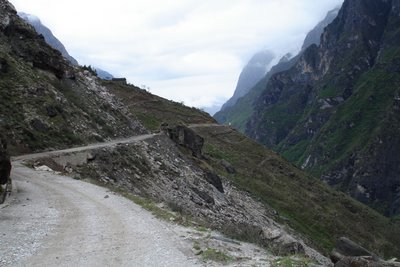 I don't really have anything good to say about DaLi and LiJiang, so I won't. Onto Tiger Leaping Gorge. Located about ten kilometers after the "first bend" of the Yangtze River (where the Yangtze essentially turns back on it's self, therefore flowing out into central China rather than Southeast Asia - you understand the significance), the gorge is flanked by 4000 meter peaks on both sides, while the Yangtze flows at 1900 meters. It's big. It's so big that it was really difficult to take a decent picture of it. You had to be there.
I don't really have anything good to say about DaLi and LiJiang, so I won't. Onto Tiger Leaping Gorge. Located about ten kilometers after the "first bend" of the Yangtze River (where the Yangtze essentially turns back on it's self, therefore flowing out into central China rather than Southeast Asia - you understand the significance), the gorge is flanked by 4000 meter peaks on both sides, while the Yangtze flows at 1900 meters. It's big. It's so big that it was really difficult to take a decent picture of it. You had to be there.
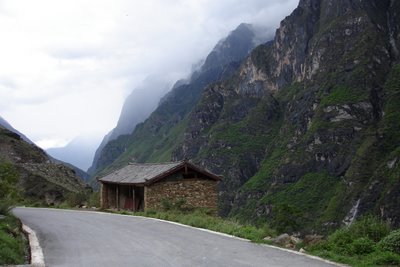 Roadside house.
Roadside house.
 There's even farming in a few more open spots along the gorge.
There's even farming in a few more open spots along the gorge.
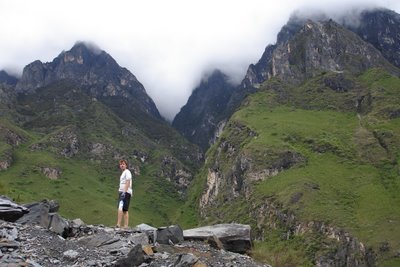 We waited here for a couple of hours after we came upon a little landslide that injured three road workers. It seems that while they were clearing the rocks from an earlier landslide, more rocks came down and broke a few arms. It was a little scary for a while, as those with the "authoritah" were panicking. Eventually a van was commandeered to shuttle these boys to the hospital. After the authoritah left, some locals took to clearing the rocks that blocked the road themselves. They would sprint into the red zone, grab or push a rock of the edge and sprint out. Then another guy would take his turn. I can attest that at least two more fair sized rocks fell during this operation. After it was suitably clear, a truck approached the slide area and everyone but the driver got out. They ran across one by one, and finally the truck sped through. About twenty vehicles proceeded in this manner. It had been about an hour since the last rocks had fallen, so last of all Brett and I also made our way through. hmmm maybe I shouldn't tell this story.
We waited here for a couple of hours after we came upon a little landslide that injured three road workers. It seems that while they were clearing the rocks from an earlier landslide, more rocks came down and broke a few arms. It was a little scary for a while, as those with the "authoritah" were panicking. Eventually a van was commandeered to shuttle these boys to the hospital. After the authoritah left, some locals took to clearing the rocks that blocked the road themselves. They would sprint into the red zone, grab or push a rock of the edge and sprint out. Then another guy would take his turn. I can attest that at least two more fair sized rocks fell during this operation. After it was suitably clear, a truck approached the slide area and everyone but the driver got out. They ran across one by one, and finally the truck sped through. About twenty vehicles proceeded in this manner. It had been about an hour since the last rocks had fallen, so last of all Brett and I also made our way through. hmmm maybe I shouldn't tell this story.
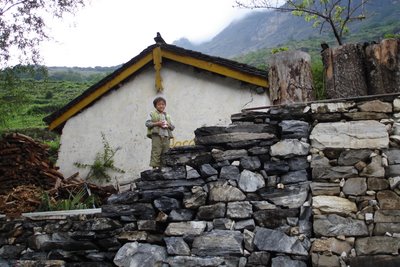 We stayed at a nice guest house in the gorge for the night. There, this little girl taught me the correct way to beckon "BaoZi" the dog. She also laughed to herself every time she saw me walking (I developed a limp, not from bicycling, but after walking my knee into a firehydrant placed in the middle of the sidewalk in LiJiang).
We stayed at a nice guest house in the gorge for the night. There, this little girl taught me the correct way to beckon "BaoZi" the dog. She also laughed to herself every time she saw me walking (I developed a limp, not from bicycling, but after walking my knee into a firehydrant placed in the middle of the sidewalk in LiJiang).
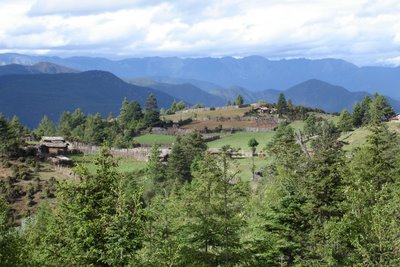
The little farmstead above was around 3400 meters. They raise pigs, horses and a few cattle, and farm wheat and vegetables.
After the gorge, we continued on a backroad towards ZhongDian and eventually over a huge pass. We must have done about 1700 meters of climbing over two days. It was slow going, but the views were great. There were four distinct valleys, scenically and culturally. In one valley an older women dressed in full traditional wear stuck her tongue out at me (this is a greeting I understand?). I stuck my tongue out at her in return and she laughed.
One valley I have named "Friendly Valley" and the next I named "Crazy Valley". In "Crazy Valley" I was accosted by a marauding group of ten year olds. They grabbed onto my panniers and stopped me dead in my tracks. They demanded chocolate. They attempted to open my bags, and then tried to take them off my bike. I humored them for a while and then said my farewell. They immediately gave chase and managed to stop me again. In the end I had to employ a technique that I use on mountain dogs. I pretended that I was going to kick them with one foot as I rode away. It worked.
A man also hissed at Brett in Crazy Valley.
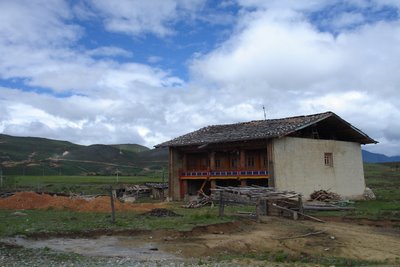 We came over the pass and dropped down a few hundred meters, but everything was different. The houses, the people, the livestock. Yaks everywhere. Monstrous houses. I guess this was the cultural border of Tibet. 30 km we arrived here in ZhongDian...
We came over the pass and dropped down a few hundred meters, but everything was different. The houses, the people, the livestock. Yaks everywhere. Monstrous houses. I guess this was the cultural border of Tibet. 30 km we arrived here in ZhongDian...
A current events section of my highly informative blog follows...
Strangely enough, I may be teaching English again soon. I've been offered a job as an English Instructor at an English camp in Korea. I did apply for this job, so it's not as random as it might seem...
Your input regarding whether or not I should take the job will be given 50% weight in my consideration. Leave your comments below. The remaining 50% will be determined with the flip of a coin.
If I decide to take this job I will fly to Seoul in mid July and stay until late August. Then I can come back to China and... do something. I am forming more diabolical plans in regards to what exactly I should do. I guess I'll let you know.
On a slightly different note, I'd like to say "Gong Xi Gong Xi" to my sister Simone and Neil. If you didn't know it yet, they recently got engaged. Congratulations and love from across the way.
If you're interested in getting to know these two fine young people more, you can check out their blogs on the right. Maybe they could start a couples blog detailing their engagement and the trials and tribulations of organizing a wedding! Could be good reading.
They're probably getting married next year from what I understand. I guess if you don't see me before then, you'll see me... then.
I know that I have a bad track record for attending friends and family's weddings in the past few years. So, if any other people out there are thinking about getting married next year, perhaps you could get married a week before or after my sister.
If you do, I promise here and now that I will attend.
 Once we found the trail leading the the lakes and stashed our bikes in the forest, it was pretty easy going. The trail was over a meter wide, and followed a river up into the mountains from the mainroad for about 25 km. We later learned that the trail had been a branch of the Cha Ma Gu Dao or "The Tea Horse Trail", the famed ancient trading route that runs from China into Tibet and Myanmar.
Once we found the trail leading the the lakes and stashed our bikes in the forest, it was pretty easy going. The trail was over a meter wide, and followed a river up into the mountains from the mainroad for about 25 km. We later learned that the trail had been a branch of the Cha Ma Gu Dao or "The Tea Horse Trail", the famed ancient trading route that runs from China into Tibet and Myanmar.  We were making our way up to the lakes that evening when I took this picture.
We were making our way up to the lakes that evening when I took this picture.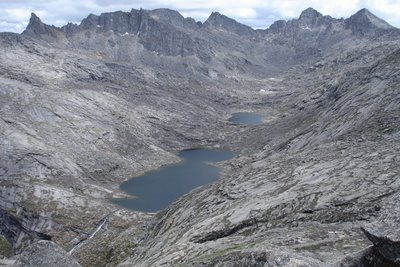 The next day we went to summit a mountain overlooking the lakes in the hopes of getting a fine view and breaking 5000 meters. Though the peak turned out to be 4950 meters (over 16000 feet), the view of the lakes and surrounding valleys was spectacular. The air was thin, and so the trick was to breath heavily through your mouth as you climbed. Every 20 or 30 steps up the mountain required a little rest to catch your breath. It was cold, but well worth it.
The next day we went to summit a mountain overlooking the lakes in the hopes of getting a fine view and breaking 5000 meters. Though the peak turned out to be 4950 meters (over 16000 feet), the view of the lakes and surrounding valleys was spectacular. The air was thin, and so the trick was to breath heavily through your mouth as you climbed. Every 20 or 30 steps up the mountain required a little rest to catch your breath. It was cold, but well worth it.  While heading back to camp later that afternoon we were caught in a thunder storm. By the time we got back to camp we were soaked and freezing cold, and so we decided to head to a nearby herder's house. They had suggested that we should sleep there the night before, and we finally took them up on it.
While heading back to camp later that afternoon we were caught in a thunder storm. By the time we got back to camp we were soaked and freezing cold, and so we decided to head to a nearby herder's house. They had suggested that we should sleep there the night before, and we finally took them up on it. We warmed up quickly around their fire, and eventually feasted on momos (Tibetan steamed bread), hot butter tea, boiled yak's milk, yak cheese, yak yoghurt, and bai jiu. I like Yaks.
We warmed up quickly around their fire, and eventually feasted on momos (Tibetan steamed bread), hot butter tea, boiled yak's milk, yak cheese, yak yoghurt, and bai jiu. I like Yaks. They were up at the crack of dawn to milk the yaks. Everything was fogged in and the air was biting.
They were up at the crack of dawn to milk the yaks. Everything was fogged in and the air was biting. A little while later the sun crested the peaks and began to burn off the fog. By this time the four had milked over one hundred yaks and were prepared to start churning the milk.
A little while later the sun crested the peaks and began to burn off the fog. By this time the four had milked over one hundred yaks and were prepared to start churning the milk. We left their shelter a while later, full after a breakfast of butter tea and tsampa - a delicious mixture of barley flour and sugar moistened with butter tea. We bought some cheese that I've been eating on the road during the past few days. Perfect to stuff in the local pan bread with some of the chives I've been finding on the high platues.
We left their shelter a while later, full after a breakfast of butter tea and tsampa - a delicious mixture of barley flour and sugar moistened with butter tea. We bought some cheese that I've been eating on the road during the past few days. Perfect to stuff in the local pan bread with some of the chives I've been finding on the high platues.